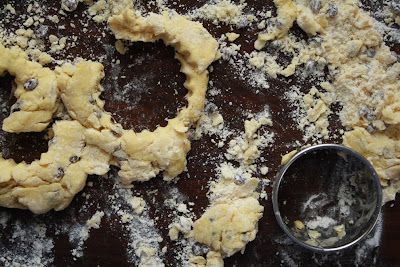I had my parents over for tea on Sunday. I baked scones and served them with orange marmalade and whipped crème fraîche. There were daffodils on the table and macaroon nests complete with speckled chocolate eggs. It was a lovely event, all in all, except that I was disappointed with the scones I served and the crème fraîche I had made before my trip to Israel had become a little too sour. I've always had a bit of a scone complex the way other people have anxiety about pie crust or curdling custard. I was determined to kick it today and, with the help of The Fundamental Techniques of Classic Pastry Arts, I think I did.
After some initial concern that my dough was too dry, my scones came out flaky, like they're supposed to, and golden and tender and just begging for a dollop of clotted cream.
Currant Scones
adapted from The Fundamental Techniques of Classic Pastry Arts
- 325 g bread flour
- 45 g sugar
- 20 g baking powder
- pinch salt
- 110 g butter, cold, cut into pieces
- 100 g dried currants
- 1 large egg, room temp.
- 1 egg yolk, room temp
- 100-145 mL heavy cream
- Preheat oven to 350°F. Line a baking sheet with parchment paper or a silicone mat and set aside.
- Combine the flour, sugar, baking powder, and salt. Drop in the butter and cut it into the flour using a pastry cutter until the mixture forms pea-sized pieces. Avoid over cutting the butter, or your scones will be dense not flaky.
- Lightly beat together the egg and yolk in a measuring cup. Pour in enough cream to bring the mixture to 200 mL. Stir to combine the eggs and cream. Add the egg mixture to the dry ingredients and mix just until a dough forms.
- Lightly flour a work surface and turn the dough out onto it. You might have to give the dough a brief knead to bring it together. Lightly pat the dough until it is about an inch thick. Using a round, fluted biscuit cutter, cut out scones and place them on the prepared baking sheet. You can of course cut the scones into the shape of your choice. Brush with either a cream or egg wash and sprinkle with coarse sugar if you like (I happen not to). Bake in the preheated oven 15-25 minutes or until scones are nicely browned on the bottom and edges. Serve immediately.
Makes about one dozen scones.
They say the doom of things like scones in overhandling and they're probably right, but don't be afraid of handling them at all. If your dough is quite dry, as mine was, it might take a knead or two to bring the dough together. Give your dough what it needs and you can't go too far wrong.
I'm glad to have overcome my scone making anxiety. They're supposed to be one of those things you can whip up when someone drops by and offer with a comforting cup of something hot. I might not be a that point yet, but with practice I will be.









No comments:
Post a Comment